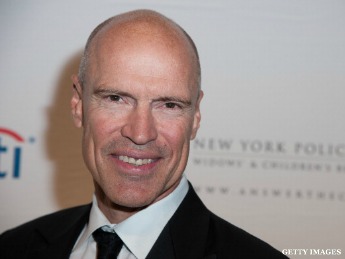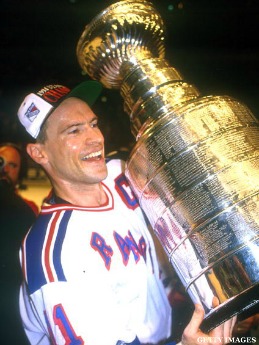
NHL Hall of Famer Mark Messier is the CEO of what soon will become the world's largest indoor ice complex. Last week, the New York City Council approved plans for construction of the Kingsbridge National Ice Center in the Bronx, an area not usually connected to hockey culture. Completion of the project is slated for 2017, and Messier hopes to follow in the tradition of his sports idol, Muhammad Ali, by bringing opportunity and hope for the less fortunate.
With its nine rinks, the complex will promote a bevy of ice sports and has the backing of Olympic gold medalist Sarah Hughes, a figure skater. The $320 million project is supported entirely by private funding and promises to pay workers a living wage, so followers will have to keep track of those socioeconomic guarantees.
Messier discussed the ice center, his experience testing out Bombardier Recreational Products' new Can-Am Spyder motorcycle and the recent lawsuit filed by 10 former NHL players alleging negligence by the league toward head injuries.
ThePostGame: Can you tell me your favorite activity in retirement?
MARK MESSIER: That's one of the reasons I was so eager to get involved [with the Can-Am Spyder] because I spend a lot of time on the water -- fishing, riding all the watercrafts and skidoos. I spent much of my youth skidooing on the snow and of course riding all kinds of open-air vehicles. I like the outdoors -- I like adventure. I've always been a sportsman from a long time ago growing up and always have had an interest in trying new things. I have always loved to drive and ride. Bombardier is a line of off-road vehicles and whatnot, so this was a no-brainer for me.
TPG: Can you discuss the Kingsbridge National Ice Center project in a little bit more detail?
MESSIER: The Bronx has been an incredible initiative for me personally. In 1994, we inspired a generation of hockey fans because of the story that was unfolding with [the first Stanley Cup in 54 years] to come to the New York Rangers. That generation of fans all turned around to see that in order for them to play hockey, it wasn't easy living in a metropolitan area. And here we are with an opportunity to change the face of hockey in this area.
We're sorely lacking in ice facilities of all ice sports, and at the time we were doing this [project], we didn’t expect to come across a building as enormous and as impressive as the Kingsbridge Armory. But we soon realized that we could buy an ice rink in there that would make us the biggest sports complex in the world under one roof. But more importantly, we came in trying to be partners with the community and the people there ... and the Armory will be transformed into Kingsbridge National Ice Center. It'll be an economic engine for the Bronx.

TPG: How do you think that hockey culture in New York has changed over the past 20 years, like you were saying?
MESSIER: There's a lot of interest. The Bronx itself is the seventh-largest city in the United States [excluding Brooklyn, another New York City borough] with 1.4 million people. They don't have one ice rink in the Bronx currently. So everybody says, 'kids in the Bronx don't play hockey.' Well of course they don’t play hockey. How can they? They don’t have an ice [rink]. A big initiative of ours is to create a new generation of kids that haven’t currently had the opportunity to play hockey, whether it was because of financial reasons or for acceptability, and for the current boys and girls and men and women that are playing in the city -- we[re going to give them a better opportunity to get more acceptability to ice [sports]. I’m talking not only hockey but all ice sports.
TPG: You have also said that Muhammad Ali was your favorite athlete growing up. What drew you to him, and how did that translate to your hockey game growing up?
MESSIER: For me it's about being inspired and having a passion for what you do, and I think Ali exemplified that. He was a charismatic man, he was an incredible athlete and he was bigger than boxing. The buildup to his fights was obviously very exciting, but it was the way he handled himself and what he stood for -- the way he dedicated himself to a sport, reached out to children and made a difference in lives and traveled the world as an ambassador.
TPG: Who are your favorite athletes to watch in the NHL and sports in general currently?
MESSIER: Well, growing up, I was a big Bobby Orr fan -- big Guy Lafleur fan. Obviously being able to play and watch Wayne [Gretzky], I learned a lot from him, so he was a big fan of mine as well. But currently I love watching Sidney Crosby play. [Evgeni] Malkin is an amazing player. Mostly if you look around the league right now, I’m not sure if there’s been a time in the game where there’s been more incredible talent spread throughout the whole league. That speaks volumes for the NHL and where we're headed for the future.
TPG: The NHL has definitely made a lot of positive progress. I know that one of the big issues though -- and this is an issue in the NFL too -- is concussions. There was recently a lawsuit [filed against] the NHL, and I was wondering if you have an opinion on that?
MESSIER: There's not a day that goes by that the NHL and the NHL Players' Association don’t work constantly to make our game more exciting, more accessible, safer, better. And that is an ongoing commitment that the players and the owners and the league have made to each other. I can’t speak for the other leagues, but I know from the NHL’s perspective, that’s an initiative.
TPG: There have been, in the NFL, a lot of changes in terms of sideline procedure. Do you think that there’s been that progress made in treatment and attention to concussions in the NHL since you retired?
MESSIER: It's a priority. It's something that the league and the players understand and have better understanding on, and we continue to make the commitment to each other to make the game better and more entertaining.
| Subscribe to ThePostGame's video channel: |




